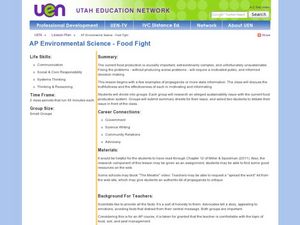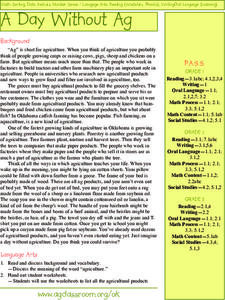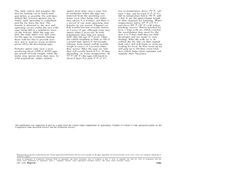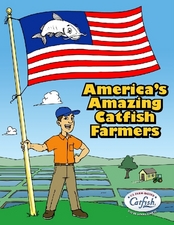Curated OER
Aquaculture: Down on the Salmon Farm
Learners examine the problems of the continued development of aquaculture. They also brainstorm ideas that people in this field would need to be successful.
Curated OER
AP Environmental Science-Food Fight
The content in this instructional activity is of a controversial nature. Please review to make sure it is suitable for your class. A video, The Meatrix is shown to the class, and then they discuss the emotionally-charged language that it...
Curated OER
The Aquatic Environment
Fifth graders focus on the various types of fish living in different water environments. In groups, they research the different methods used to fish and participate in experiments to determine the effects of mercury on fish, the...
Curated OER
Aqualung , the New Age Garden
Students examine how underwater landscape could be used for food production in the future. They discuss underwater landforms, draw a picture of an underwater landscape and a type of technology to use underwater, and write a description...
Curated OER
Farming in a Fishbowl: How Ethnic Groups in
Seventh graders research Chinese agricultural needs and practices. They conduct an experiment with aquaculture and germinated rice as they take measurements and apply the scientific method.
Curated OER
Biologically Altered (B/A Fish)
Young scholars complete a variety of activities as they examine the ethics involved in biologically altering fish. They hold a mock town meeting in which they determine whether or not a transgenic aquaculture should be allowed to locate...
Curated OER
The Artemia Hatchery
Students, in groups, develop their hatcheries, working cooperatively in its design and construction. The lessons begin with the introduction to Artemia as a primary food source of many aquaculture species during their larval stages.
Curated OER
A DAY WITHOUT AG
Young scholars consider and discuss the meaning of the word "agriculture" and how agriculture affects their lives every day. Students identify the various ways that agriculture touches their personal lives. Young scholars use worksheets...
Curated OER
A Day Without Ag
Learners investigate the concept of agriculture. They focus upon the presence of agriculture and the personal implications of it. Students generate lists related to the concept to encourage group discussions. The products of agriculture...
Curated OER
The Fish Trade
High schoolers read and discuss a document regarding how the global fish trade is important to humans all over the world. Students conduct Internet research and write a scenario about what would happen if other countries did not help...
Curated OER
Going Global
Students describe the importance of aquaculture as a source for protein intake by humans globally. They are given a number from 1-3 as they enter the class. All "1's" recieve 10 beans. All "2's" recieve 5 beans. All "3's" recieve 1 bean....
Curated OER
Channel Catfish
Students study the life and biology of the Channel Catfish. In this aquatic biology instructional activity, students will examine the external and internal features of the catfish along with their breeding habits and environment. This...
Curated OER
Catfish Coloring Book
In this catfish coloring book worksheet, students read information about catfish and color pictures in a twenty-page coloring book. Final page contains recipes.
Curated OER
Do we Really Need Wild Nature
Students research challenges with which modern biotechnology confronts wild nature. Students collect articles that relate to biotechnology and the environment. Students prepare a collaborative answer to the question, "Do we really need...















